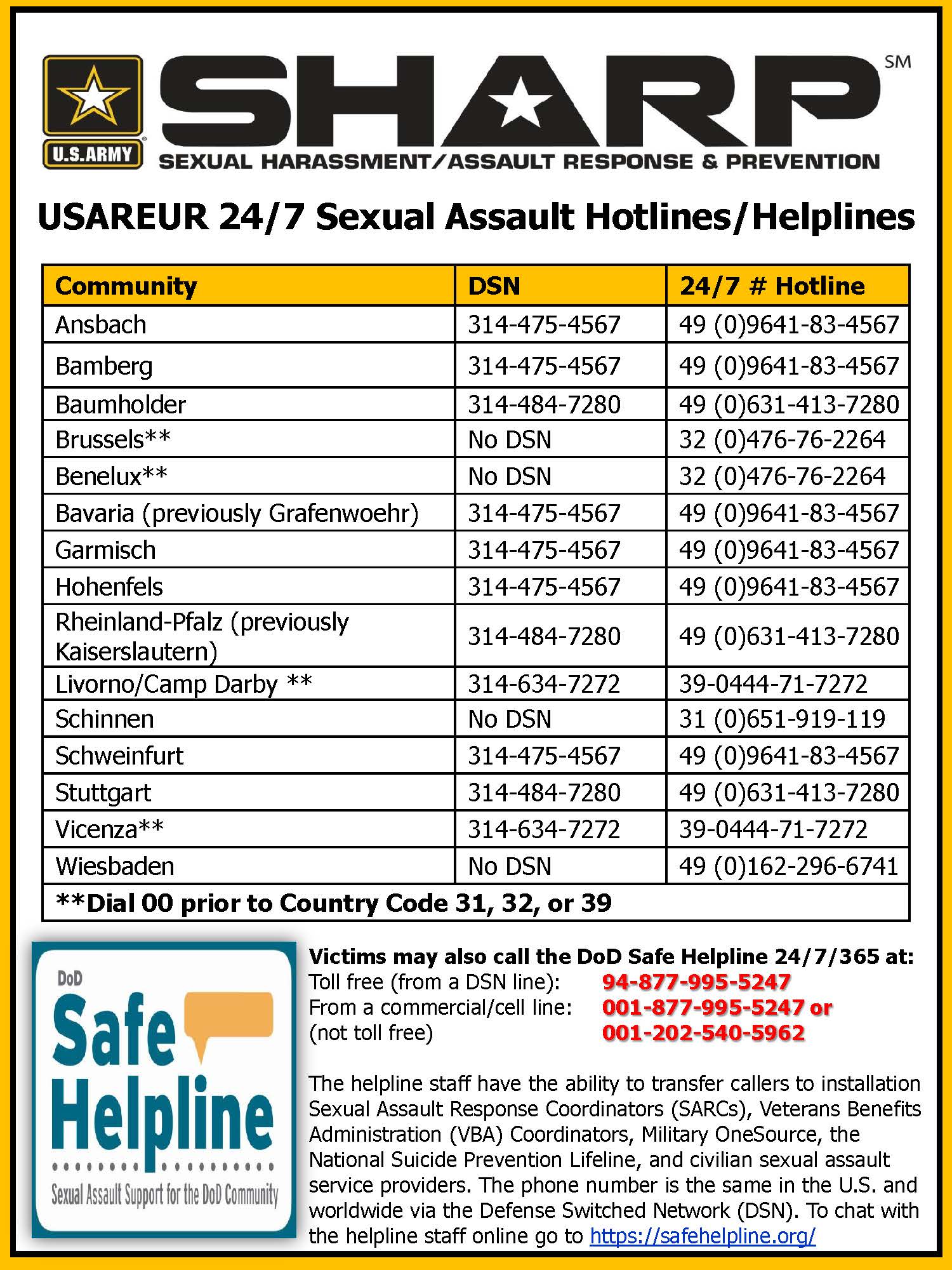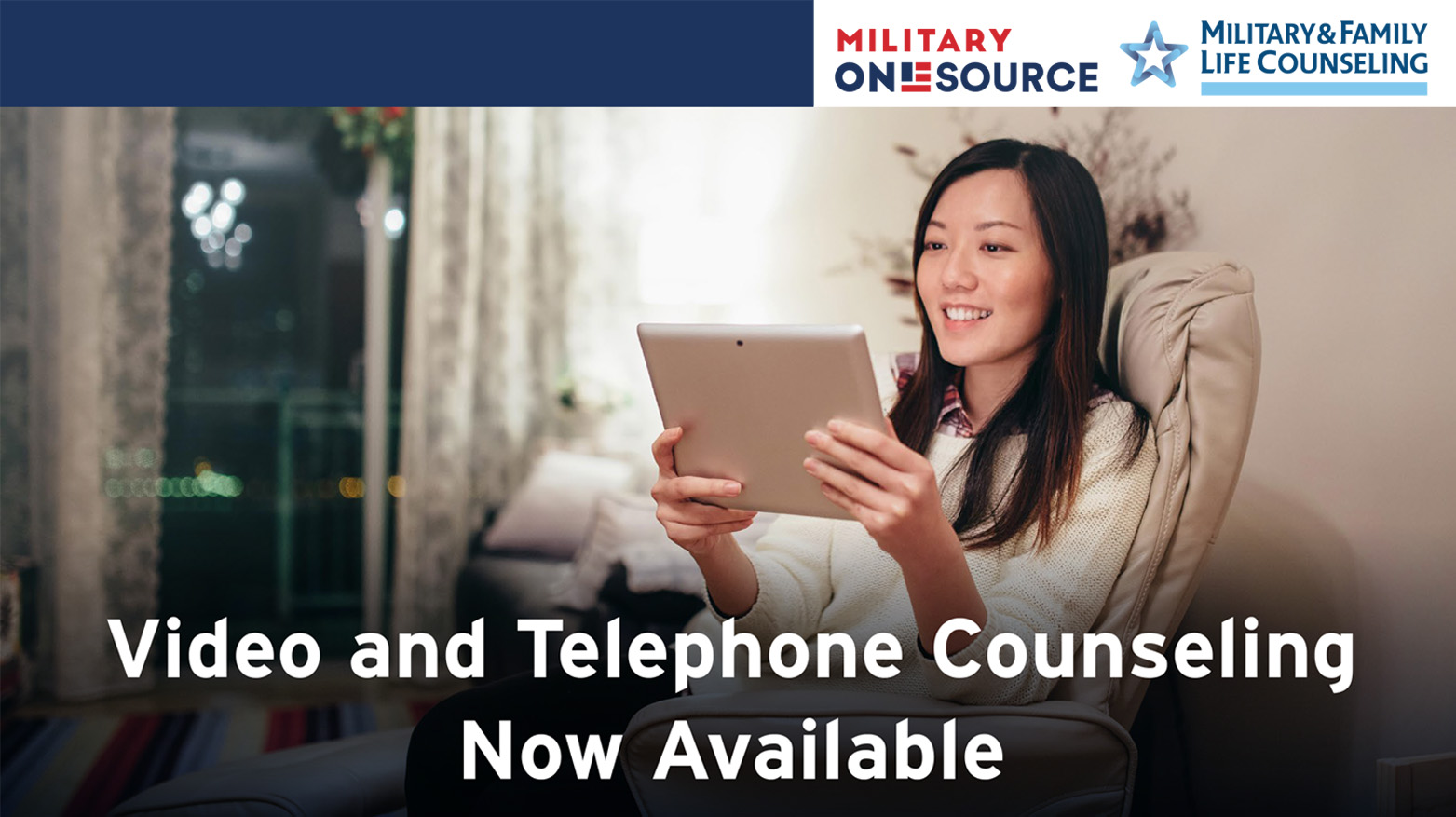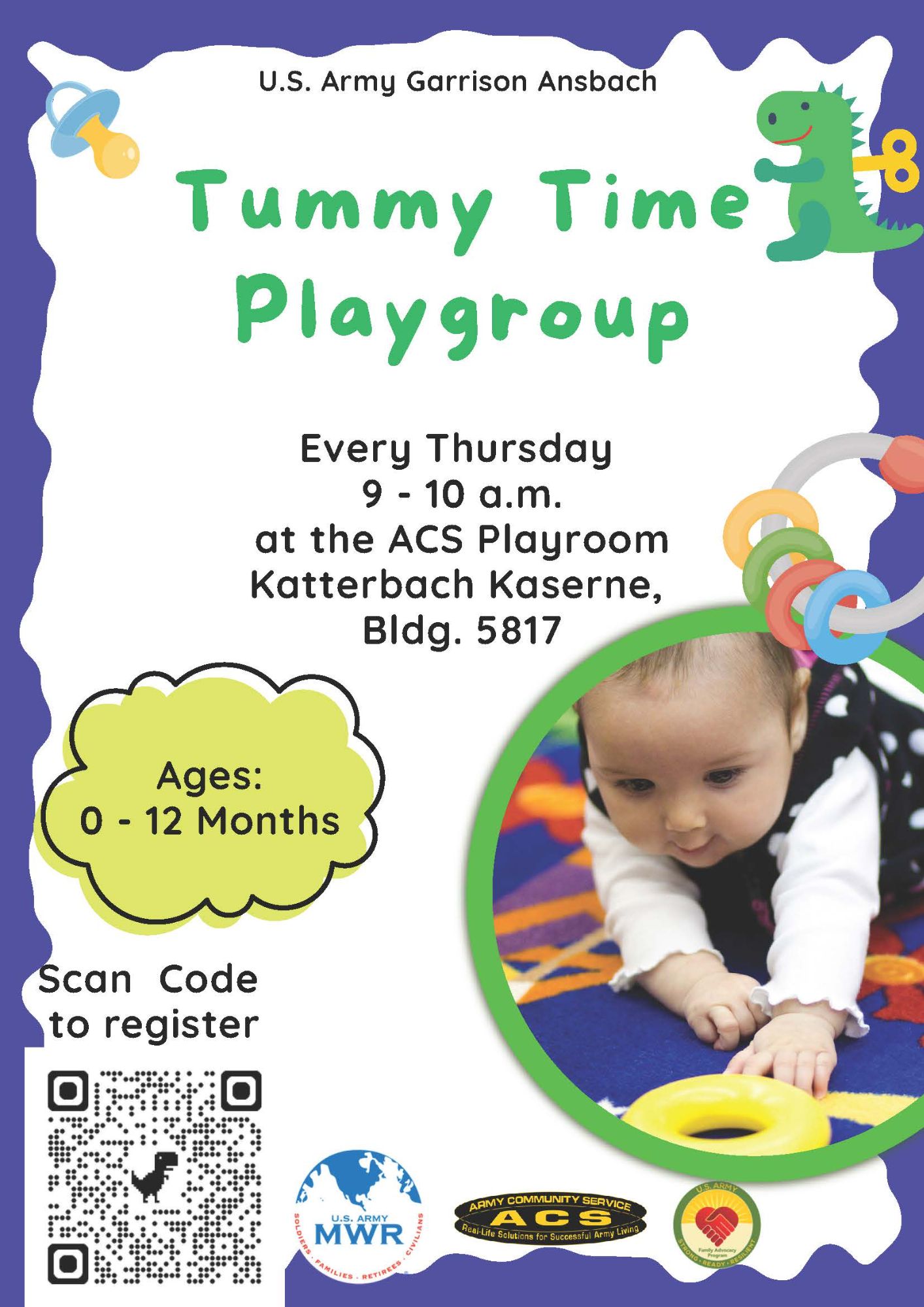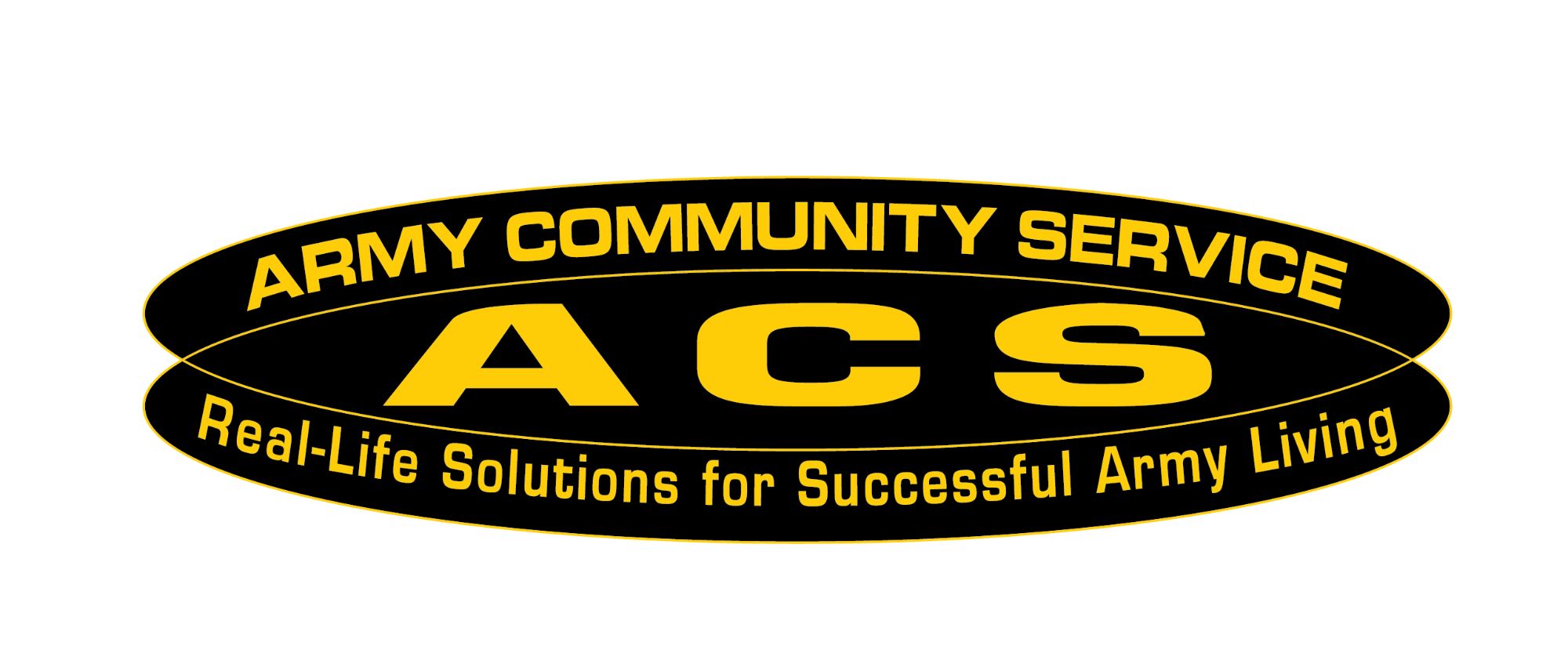- ACS Mission
-
The mission of ACS is to facilitate the commander's ability to provide comprehensive, standardized, coordinated and responsive services that support Soldiers, Department of the Army civilians, and Families regardless of geographical location and to maximize technology and resources, eliminate duplication in service delivery and measure service effectiveness.
ACS facilitates the commander's ability to provide comprehensive, standardized, coordinated and responsive services that support Soldiers, Department of the Army civilians, and Families regardless of geographical location and to maximize technology and resources, eliminate duplication in service delivery and measure service effectiveness.
- Army Emergency Relief (AER)
-
Army Emergency Relief (AER), https://www.armyemergencyrelief.org/, is a private, non-profit organization established to assist Soldiers and their Family members in emergency financial situations due to no fault of their own. Financial assistance is given in the form of an interest-free loan, grant, or combination of the two. Loans are repaid by an allotment.
AER helps with emergency financial needs in over 30 different assistance categories, to include:
- Food
- Rent
- Utilities
- Emergency transportation & vehicle repair
- Funeral expenses
- Medical/dental expenses
- Personal needs when pay is delayed or stolen
AER partners with other military aid societies to enable local assistance for service members from the Air Force, Navy, Marine Corps, and Coast Guard.
Three ways to apply for AER assistance:
Talk to your chain of command - Your chain of command has the power to approve immediate financial assistance up to $2,000 through the Quick Assist Program. Your chain of command can also refer you to the on-post AER officer. Your chain of command is empowered to help. Just ask!
Visit your AER officer - Any Soldier (active or retired) can visit the AER officer at Army Community Service. No Army post nearby? No problem! Soldiers can visit any military installation and request AER assistance from any military aid society.
Call the American Red Cross - Not located within 50 miles of a military installation? The American Red Cross is authorized to provide financial assistance on behalf of AER. Call the American Red Cross at 1-877-272-7337 and select the option for financial assistance.
Education Programs
AER also provides scholarships toward education. AER gives spouses and dependent children of Army Soldiers great opportunities for their first undergraduate degree (some scholarships can reach $4,000 annually)! Application information can be found online at https://www.armyemergencyrelief.org/scholarships/. For more information, contact the Army Emergency Relief Officer at Army Community Service.
AER Resources & Forms
- Army Family Action Plan (AFAP)
-
Army Family Action Plan is your platform to voice your quality-of-life issues, ideas, or suggestions and contribute to help better your community. It’s the best way to let Army leadership know about what works, what doesn’t, and how you think problems can be resolved. We give Active and Reserve Component Soldiers, Army Civilians, Retirees, Survivors, and Family members a primary tool to help identify issues and concerns and shape your standards of living.
We encourage the community to submit issues to your Army Community Service, in person or by email, or online through the Army Family Web Portal (AFWP) AFAP Issue Management System (IMS). The information you submit gives Army leadership insight and helps foster a satisfied, informed, and resilient Army Community.
AFAP makes a meaningful difference. Since its inception in 1983, AFAP remains the only such partnership between a branch of the United States military and its constituents. Thus far, 744 issues elevated to HQDA and resulted in: 129 Legislative Changes, 197 Department of Defense or Army policy changes, and 216 improved programs or services.
Here’s a sample of AFAP results:
- Paternity leave (Issue 578)
- Chiropractic treatment for AD Soldiers (Issue 468)
- Spouse professional weight allowance (Issue 531)
- Family Member Employment in the Civil Service System (Issue 38)
- Convicted Sex Offender Registry (Issue 596)
- Exceptional Family Member Program Enrollment Eligibility for Reserve Component Soldiers (Issue 650)
- Audio/Video Surveillance in Childcare Centers (Issue 447)
- Standard Level of Security Measures in Barracks (Issue 658)
Scan the QR Code to submit an issue.

To view all submitted AFAP Issues from 1983 to present, click here.
- Army Family Team Building (AFTB)
-
Army Family Team Building (AFTB) is a Family training and readiness program, established on December 16, 1994, by General Gordon R. Sullivan, Chief of Staff of the Army, and Sergeant Major of the Army Richard A. Kidd. AFTB provides participants with a better understanding of Army culture, as well as the skills and resources needed to become resilient, self-sufficient and self-reliant members of the military community.
AFTB's goals are to: Prepare individuals through specialized training generating flexible, adaptive and capable Soldiers, Families and Civilian. Enhance personal growth and professional development by leveraging an adaptive curriculum and technology meeting the needs of the transforming military. Employ resources to build and strengthen enduring partnerships resulting in resilient strong communities.
AFTB training modules:
· AFTB Personal Growth (G) Level - Learn how to improve your personal relationships and communication and stress-management skills. Discover how teams form and grow, how to solve problems, and how to resolve personal conflict. You’ll also learn about Army traditions, customs, courtesies and protocol.
· AFTB Military Knowledge (K) Level - You’ll learn about the Army life and how to maneuver through daily challenges by discovering how to decipher Army acronyms, utilize community resources, attain better financial readiness, and understand the goal and impact of the Army mission on daily life.
· AFTB Leadership Knowledge (L) Level - Thrive in the Army and civilian life by expanding leadership skills and effective communication techniques and learning to mentor others into leadership positions. You’ll learn about the different leadership styles, how to run an effective meeting, how to manage group conflict, and how to coach and mentor others.
The training is available to Soldiers, Family members of all Soldiers, Department of Defense civilians and volunteers through the Army Family Web Portal (AWP), https://armyfamilywebportal.com Online Learning Management System (OLMS).
For more information visit your ACS to speak with the AFTB Program Manager!
- Army Volunteer Corps (AVC)
-
The Army Volunteer Corps plays a crucial role in community involvement and development. Volunteers make a meaningful difference in the lives of Soldiers and their Families every day. Army Volunteer Corps is designed to help you find local volunteering opportunities with organizations that benefit the Army community and allows you to obtain ongoing training and advancement.
The AVC has redefined volunteering within the Army. We embrace existing volunteer programs, unite all volunteers who support Soldiers and Families, including the Active Force, National Guard and Army Reserve, and formalize the Army’s commitment to volunteerism.
No matter where people volunteer in the Army community, they usually want to contribute to Soldiers and their Family members. We recognize this common goal and want to help you find the right opportunity for you.
Volunteering helps your community and helps you as well. When you participate with AVC, you will:
· Gain a sense of satisfaction/achievement by meeting challenges.
· Learn about the Army, our sister services, and the community.
· Acquire new skills and/or expand old ones.
· Obtain work experience.
· Build new friendships and become a cohesive part of the community!
Build your resume, learn new skills or sharpen skills.
Track your hours using the Army Family Web Portal (AFWP) Volunteer Management Information System (VMIS). VMIS provides tools to manage volunteerism.
· What is VMIS? Volunteers play an integral role in the life of Soldiers and their Families and are found throughout the military community. VMIS assists the Army Volunteer Corps and Organization Point of Contact (OPOC) in managing these dedicated volunteers and allows volunteers a way track their hours, awards, trainings and certificates.
· What can volunteers do in VMIS? Volunteers can apply for volunteer opportunities, record and track volunteer hours, and manage their volunteer service record.
· What can administrators do in VMIS? Administrators can engage in online volunteer recruitment, manage military community volunteerism (hours, positions, awards, and trainings), and produce simple reports on program statistics and recognition ceremonies.
For more information regarding volunteering, or training opportunities please contact your ACS!
- Employment Readiness Program (ERP)
-
The Employment Readiness Program (ERP) offers resources to help with your career plan and job search. Whether you’re a military spouse or Family member who just moved to a new installation, retiree, DoD Civilian looking for new opportunities, or active duty military, Active Reserve, National Guard member, or Wounded Warrior, we’re here to help.
Our services include:
- Up-to-date information on local, national, and international employment opportunities, job market trends and education, and volunteer resources
- Information on job fairs (in person and virtual) and other hiring events
- Assistance with employment applications
- Career counseling and individual career assessments
- Résumé critiques
- Classes and seminars on self-assessment and career exploration, resume writing, interviewing techniques, dressing for success, networking, and entrepreneurship
- Information on spouse licensure reimbursement (re-licensing at a new duty station can be costly)
*Not all programs and classes are available at all ACS facilities.
Are you ready? Contact your Employment Readiness Program manager (ERPM) for more information.
Additional Resources:
(Government Links)
- Army Spouse Employment, Career and Education Resource Links: a good place start investigating employment options
- Military Spouse Education & Career Opportunities (MySECO): education and career guidance for military spouses
- Military OneSource Spouse Education and Employment: a source for trustworthy guidance on entering the workforce
- The Military Spouse Employment Partnership (MSEP): Military OneSource’s portal to connect spouses and employers
- USAjobs.gov: the Federal Government’s employment portal
- Home Based Business (HBB): options for businesses that operate from on-post quarters
- The U.S. Department of Labor: transition assistance and employment preparation for military spouses
(Non-Government, No Endorsement Implied)
- The U.S. Chamber of Commerce’s Hiring Our Heroes: An initiative that assists veterans, transitioning service members, and military spouses find meaningful employment
- Exceptional Family Member Program (EFMP)
-
The Exceptional Family Member Program (EFMP) provides comprehensive support to Family members with special needs. An Exceptional Family Member is a Family member with any physical, emotional, developmental, or intellectual disorder that requires special treatment, therapy, education, training, or counseling, and meets the eligibility criteria. EFMP pertains to active-duty Soldiers, US Army Reserve Soldiers in the Active Guard Reserve (AGR) Program, and Army National Guard AGR personnel serving under authority of 10 USC or 32 USC. Department of the Army Civilians do not enroll in the program.
EFMP takes an all-inclusive approach to coordinating military and civilian community, educational, medical, housing, and personnel services to help Soldiers and their Families with special needs. Enrollment in EFMP includes a wide array of benefits, detailed in the EFMP Benefits Fact Sheet.
EFMP enrollment does not adversely affect promotions, schools, or assignments. EFMP information is not made available to selection boards.
Soldiers with Exceptional Family Members are required to register for EFMP and keep enrollment information current. That way, Family needs will be considered during the OCONUS assignments process. If you’re eligible for EFMP services, Family members must be screened and enrolled when they accompany authorized Soldiers on OCONUS assignments. Screenings include a medical records review for all Family members and developmental screening for all children 72 months and younger. (Special education needs are considered only in assignments outside the United States. Assignments within the US and its territories are not based on the educational needs of children).
For more information about EFMP and helpful articles about the program, look at the Enterprise EFMP site. After that, contact the installation EFMP manager at your Army Community Service (ACS) office. To learn more about medical enrollment, see the Program Overview.
EFMP Resources
Here are some helpful resources for EFMP Families.
(Government Links)
Systems Navigators. Systems navigators are ACS EFMP staff members available on most Army installations. They assist EFMP Families with navigating through the available systems of care. EFMP Newsletter. The Exceptional Advocate is the DoD’s EFMP newsletter, which includes helpful information and resources. Military OneSouce. Military OneSource’s EFMP & Me tool allows Families to explore the details of EFMP benefits and processes.
(Non-Government Links, No Endorsement Implied)
Center for Parent Information and Resources (CPIR). CPIR serves as a central resource of information and products to the community of Parent Training Information (PTI) Centers and Community Parent Resource Centers, so they can focus their efforts on serving Families of children with disabilities. American Camp Association (ACA). The ACA is a community of camp professionals who join together to share their knowledge and experience and ensure the quality of camp programs, including those for Exceptional Family Members.
- DirectSTEP. DirectSTEP® eCourses are available for free to Soldiers and Family Members, Army EFMP staff, and Special Education staff associated with teaching military children. DirectSTEP® eCourses teach staff, parents, and educators how to handle critical education issues to obtain positive outcomes.
- Respite Care Support. The Army’s Respite Care Support services provide a temporary rest period for Family members responsible for regular care of persons with disabilities. Care may be provided in the EFM respite care user’s home.
Special Needs Accommodation Process (SNAP/MIAT)
The Special Needs Accommodation Process (SNAP/MIAT) is a team established to ensure the most appropriate placement of children with special needs. The team meets to review any new applications for Child and Youth Services (CYS) programs that indicate any possible special needs, review the needs of children already placed in the CYS program and determine if those needs can be met. Military Members are mandated to enroll in EFMP for most of these conditions and if they are not enrolled, the EFMP Manager will contact the Service Member and suggest that an enrollment screening into EFMP be initiated.
So what is considered a special need?
Basically anything that would requires special attention from a caretaker. It can be illnesses and conditions such as allergies, asthma, attention deficit disorder/attention deficit hyperactivity disorder, diabetes, autism, epilepsy, down’s syndrome, seizure disorder as well as physical challenges, learning disability, sensory impairment (hearing/vision), developmental delays, speech/language impairment, food allergies/intolerances and many more.
The team is comprised of the Exceptional Family Member Program Manager, the Army Public Health Nurse, CYS Coordinator/CYS Program Directors, Parent Outreach Coordinator and the Parents/Sponsors/Caregivers. Other appropriate Experts may be able to attend as augmenters if needed/requested. At the meeting the child’s needs are discussed to see if accommodations are necessary and if there are any activity restrictions. Also addressed at the meeting will be the expectations of the service to be provided by the CYS staff, as well as educational and developmental intervention program information regarding developmental evaluations, and programs and services offered by CYS.
The goal is to ensure that the child has the very best experience at CYS and that staff are trained to provide the care that a particular child needs. If your child presents a special need that is new to the staff, they will receive specialized training before your child is entrusted to their care. This training will be in addition to their periodic training that addresses special needs topics that all School Age Care staff receive.
Army EFMP Respite Care
For Active Army and Active Guard and Reserve Families who are responsible for regular care of persons with disabilities, the Exceptional Family Members Program Respite Care Program provides a temporary rest period. Care may be provided in the Family’s home or other settings such as special needs camps and enrichment programs.
The Army EFMP put respite care in place to give eligible Families, especially now with multiple deployments, the opportunity to receive respite care when it’s needed. Families apply for the Respite Care Program at the Army Community Service (ACS) EFMP Office.
Eligibility for Respite Care Program is based on EFMP enrollment and the medical or educational condition of the Family member requiring care. Qualifying Families are eligible to receive up to 40 hours of funded EFMP respite care monthly for each certified Family member.
Respite care decreases Family stress, increases Family stability and reduces costly out-of-home placements, thereby contributing to Soldier readiness. Due to increase in mobilization and deployments because of Global War on Terrorism, remaining parent/sponsor has sole responsibility for all Family support needs.
OCONUS, Respite Care services can be requested and reviewed by contacting your ACS EFMP office.
The team is comprised of the Exceptional Family Member Program Manager, the Army Public Health Nurse, CYS Coordinator/CYS Program Directors, Parent Outreach Coordinator and the Parents/Sponsors/Caregivers. Other appropriate Experts may be able to attend as augmenters if needed/requested.
- Family Advocacy Program (FAP)
-
The Family Advocacy Program is designed to strengthen and improve the quality of life for our military Families by increasing self-sufficiency, resiliency and community cohesion for active duty, Family members, civilians and retirees. Together with garrison and host nation agencies, FAP provides a multitude of programs and services designed to build individual and Family strengths as well as advocate for non-violent communities. The goals of the FAP are:
- Leverage individual and Family strengths
- Overcome behaviors that may contribute to Family maltreatment
- Value Family member differences
- Enhance behaviors that foster healthy military lifestyles
FAP professionals strive to create command and community awareness of the unique challenges associated with living in Europe, provide information on existing services to eliminate child abuse and domestic violence, and to develop specific educational programs at no cost to active duty. Our services include seminars, workshops, and individualized intervention.
FAP is dedicated to helping Soldiers and Families address the unique challenges of military life, living overseas and understanding how unmanaged stress can lead to child abuse and domestic violence. Services focus on prevention, education, prompt reporting, investigation, intervention, and treatment.
Domestic Abuse Victim Advocate Program (DAVA)
The Domestic Abuse Victim Advocate (DAVA) provides comprehensive support services to adult victims of domestic abuse including: crisis intervention, safety planning, help obtaining medical treatment for injuries, information on legal rights and proceedings, referral to military and civilian shelters, and other resources.
DAVA’s provide information so clients can make informed choices in reporting an assault and how they choose to proceed. DAVA’s are available to accompany adult clients to medical visits, court proceedings, and other appointments as requested. DAVA’s provide services 24 hours-a-day, 7 days-a-week. Victims are not alone, help and support are available.
New Parent Support Program (NPSP)
The New Parent Support Program is a voluntary program that assists military Families who are pregnant or have children birth through age three years understand the process of delivering a baby overseas and adapt to parenthood in healthy and resilient ways.
The primary focus of NPSP is providing individualized home visitation services in the parent and child’s natural learning environment however services can occur in an office, hospital or community setting. Classes and groups are available which provide information on pregnancy, nutrition, parenting newborns and toddlers, problem solving and coping, discipline issues, social isolation, and military stressors. Services are available outside normal duties hours so working parents can participate.
Each NPSP Home Visitor has a Masters degree in Social Work or a Bachelor of Science in Nursing degree and is Licensed to practice Clinical Social Work, Marriage and Family Therapy, or Nursing in a US state.
- Financial Readiness Program (FRP)
-
The Financial Readiness Program is your resource for information on money matters. We can help you better understand financial topics like:
- Military pay
- Checkbook/debit card management
- Financial responsibility
- Credit reporting
- Debt elimination strategies
- Saving
- Investing
- Budgeting
ACS also has Financial Counselors available for advice, guidance, and support. For more information about how the Financial Readiness Program can help you, contact ACS.
Other helpful financial readiness links include:
- Thrift Savings Plan: A Federal Government-sponsored long-term retirement savings and investment plan, available for both Federal civilian employees and members of the uniformed services.
- U.S. Savings Bonds: A shorter-term savings option with competitive interest rates and backed by the full faith and credit of the United States.
- Money Matters: A mobile-optimized resource with calculators for savings, debt reduction and other reference material in one location.
- Financial Literacy Game: A great way to learn about finances, integrating creativity, education and fun in a virtual world.
- Housing Resources for Military Members: The National Military Family Association has compiled a great list of resources to help Military Families who are struggling with the pitfalls of the housing crisis.
- Military OneSource: A Department of Defense-funded program that provides comprehensive information on every aspect of military life at no cost to active duty, National Guard, reserve members, and their Families.
- Office of Servicemember Affairs: A component of the Consumer Financial Protection Bureau helps to educate and empower military members, veterans, and their Families in the consumer financial marketplace.
- Saveandinvest.org: A project of the FINRA Investor Education Foundation, a free, unbiased resource dedicated to your financial health. Helps you make informed decisions through easy-to-use tools and resources, and arms you with the information you need to protect yourself from investment fraud.
- Better Business Bureau Military Line: Provides specialized education and support services, which meets the needs of active and retired military personnel and their Families.
- Information, Referral, and Follow Up Program (I&R)
-
The ACS Front Desk Reception Staff maintains a comprehensive resource file provides information on both military and civilian agencies to Soldiers, family members and DA civilians. Our trained personnel will assist clients to find the appropriate and available resources. If you have questions, our staff is here to help point you in the right direction.
In addition to helping to locate and contact resources on the installation, this program offers special Host Nation Services which includes un-certified translations of German language correspondence and bills.
- Mobilization, Deployment, and Support Stability Operations
-
The Mobilization, Deployment, and Support Stability Operations (MDSSO) helps support community readiness during deployments and emergencies. We help make sure installation programs align with unit deployment cycles, provide pre- and post-deployment support, and help unit Commanders with their Family Readiness plans and deployment support services for Service Members and their Families. We’re responsible for operating an Emergency Family Assistance Center in the case of an all-hazards event, and supporting Service Members and Families during Non-Combatant Evacuation Operations (NEO) and Repatriation. We also act as a case manager for all requests for assistance through the Army Disaster Personnel Accountability and Assessment System (ADPAAS).
Some of our resources include:
- Pre- and Post-Deployment Support: Help prepare Soldiers and Families for Deployments and Reintegration by providing trainings and resources throughout the Deployment Cycle in a variety of settings.
- Family Readiness Groups: Designed to make sure Families have information you need and develop a military support group while your Soldier is deployed. Virtual Family Readiness Groups also provide secure environments in which the commander can communicate directly with Soldiers and Families 24 hours a day no matter where you are.
- Emergency Family Assistance: Your link to continuous support and assistance as well as authoritative and accurate information in a sensitive, timely, and effective manner.
- Army Disaster Personnel Accountability and Assessment System (ADPAAS): Ensures all Army personnel and their dependents are accounted for during emergency situations.
- NEO/Repatriation: We help the State Department help those who have been displaced after national emergencies and disasters.
For more information on Mobilization, Deployment, and Support Stability Operations support in your community, contact your local Army Community Service office and ask for the Mobilization and Deployment program manager or specialist.
Other helpful links:
- Operation READY: “READY” stands for “Resources for Educating About Deployment and You.” It’s a training and information resource developed from lessons learned in the Persian Gulf War and used in Operation Iraqi Freedom (OIF)/Operation Enduring Freedom (OEF). The training covers learning about the types of military separation, planning and preparing personal documents, and completing family financial arrangements.
- Comprehensive Soldier and Family Fitness (CSF2): Provides hands-on training and self-development tools so that members of the Army Family are better able to cope with adversity, perform better in stressful situations, and thrive in life.
- Taking Care of Business: This video shares information that helps deploying Soldiers make necessary arrangements to ensure that loved ones will be taken care of if the worst happens. It explains which forms and documents to complete before deploying to ensure final wishes are observed.
- PDHealth.mil: A post-deployment resource to help ensure the highest-quality healthcare for those who make sacrifices in the world’s most hazardous workplaces.
For more information and assistance, please contact the program manager at your garrison location.
The Mobilization, Deployment, and Support Stability Operations (MDSSO) helps support community readiness during deployments and emergencies. We help make sure installation programs align with unit deployment cycles, provide pre- and post-deployment support, and help unit Commanders with their Soldier and Family Readiness plans and deployment support services for Service Members and their Families. We’re responsible for operating an Emergency Family Assistance Center (EFAC) in the case of an all-hazards event, and supporting Service Members and Families during Non-Combatant Evacuation Operations (NEO) and Repatriation. We also act as a case manager for all requests for assistance through the Army Disaster Personnel Accountability and Assessment System (ADPAAS).
Some of our resources include:
- Pre- and Post-Deployment Support: Help prepare Soldiers and Families for Deployments and Reintegration by providing trainings and resources throughout the Deployment Cycle in a variety of settings.
- Soldier and Family Readiness Groups (SFRG): Designed to make sure Families have information you need and develop a military support group while your Soldier is deployed. Virtual SFRG also provide secure environments in which the commander can communicate directly with Soldiers and Families 24 hours a day no matter where you are.
- Emergency Family Assistance: Your link to continuous support and assistance as well as authoritative and accurate information in a sensitive, timely, and effective manner.
- Army Disaster Personnel Accountability and Assessment System (ADPAAS): Ensures all Army personnel and their dependents are accounted for during emergency situations.
- NEO/Repatriation: We help the State Department help those who have been displaced after national emergencies and disasters.
Other helpful links:
- Operation READY: “READY” stands for “Resources for Educating About Deployment and You.” It’s a training and information resource developed from lessons learned in the Persian Gulf War and used in Operation Iraqi Freedom (OIF)/Operation Enduring Freedom (OEF). The training covers learning about the types of military separation, planning and preparing personal documents, and completing family financial arrangements.
- Comprehensive Soldier and Family Fitness (CSF2): Provides hands-on training and self-development tools so that members of the Army Family are better able to cope with adversity, perform better in stressful situations, and thrive in life.
- Taking Care of Business: This video shares information that helps deploying Soldiers make necessary arrangements to ensure that loved ones will be taken care of if the worst happens. It explains which forms and documents to complete before deploying to ensure final wishes are observed.
- PDHealth.mil: A post-deployment resource to help ensure the highest-quality healthcare for those who make sacrifices in the world’s most hazardous workplaces.
- Sexual Harassment/Assault Response Prevention Program (SHARP)
-

Provides awareness and prevention, training and education, victim advocacy, response, reporting and follow-up for sexual harassment/assault issues. Army policy promotes sensitive care, advocacy, treatment, reporting options for victims of sexual harassment/assault and accountability for those who commit these crimes.
Sexual Harassment Complaints
One-third of sexual assault cases begin as incidents of sexual harassment. As a military community, it is important to address sexual harassment complaints immediately when they occur. The SHARP office will assist in finding the appropriate method for addressing the situation. For military personnel and their family members, the SHARP office can assist in the following areas:
- Guidance on how to address sexual harassment issues
- Formal sexual harassment complaint intake
- Informal sexual harassment case intake
- Advocacy in dealing with sexual harassment
- Referral to other agencies and resources as required
Sexual Assault
SHARP office provides advocacy services to victims of sexual assault who are in the military and their immediate family members who are over the age of 18. Victim advocates are certified by the Department of Defense through the National Organization Victim Assistance (NOVA) in Alexandria, VA every two years. Installation SHARP victim advocates (VAs) are well trained and highly educated in the social services field. Advocates can provide sexual assault victims assistance in the following areas:
- Sexual Assault Reporting Options
- Safety Planning
- Resources available for sexual assault victims
- Administrative, legal, and medical process in sexual assault cases.
- Accompaniment to administrative, medical, and legal proceedings
- Referral to counseling services.

For further assistance and information on the Army Sexual Harassment/Assault Response & Prevention (SHARP) program call DOD Safe Helpline-Sexual Assault Sexual Assault Support for the DOD Community 1-877-995-5247 Live 1-on-1 help. Confidential. Worldwide 24/7. www.safehelpline.org
The Army Sexual Harassment/Assault Response & Prevention (SHARP) Program provides awareness and prevention, training and education, victim advocacy, response, reporting and follow-up for sexual harassment/assault issues. Army policy promotes sensitive care, advocacy, treatment, reporting options for victims of sexual harassment/assault and accountability for those who commit these crimes.
Sexual Harassment Complaints
One-third of sexual assault cases begin as incidents of sexual harassment. As a military community, it is important to address sexual harassment complaints immediately when they occur. The SHARP office will assist in finding the appropriate method for addressing the situation. For military personnel and their family members, the SHARP office can assist in the following areas:
- Guidance on how to address sexual harassment issues
- Formal sexual harassment complaint intake
- Informal sexual harassment case intake
- Advocacy in dealing with sexual harassment
- Referral to other agencies and resources as required
Sexual Assault
SHARP office provides advocacy services to victims of sexual assault who are in the military and their immediate family members who are over the age of 18. Victim advocates are certified by the Department of Defense through the National Organization Victim Assistance (NOVA) in Alexandria, VA every two years. Installation SHARP victim advocates (VAs) are well trained and highly educated in the social services field. Advocates can provide sexual assault victims assistance in the following areas:
- Sexual Assault Reporting Options
- Safety Planning
- Resources available for sexual assault victims
- Administrative, legal, and medical process in sexual assault cases.
- Accompaniment to administrative, medical, and legal proceedings
- Referral to counseling services.
- Survivor Outreach Services (SOS)
-
Our Fallen Warriors have paid the ultimate sacrifice. The Army has a commitment to their Families. Families deserve our respect, gratitude and the very best we can provide.
Survivor Outreach Services is a “one” Army program. Regardless of your loved one’s Army component, duty status, location, or manner of death, Survivor Outreach Services Support Coordinators and Financial Counselors are here to provide dedicated outreach and support when, and for as long as you desire.
SOS offers support through:
Benefits Coordinators. No one is ever fully prepared to lose a loved one, which is why we have Benefits Coordinators. Benefit Coordinators are located at the Casualty Assistance Center and are there to assist and guide you as you make the many decisions necessary following the death of a Soldier. Benefits Coordinators help identify your specific benefits and entitlements and ensure you receive what is legally yours. They assist you in completing paperwork and navigating the various agencies Survivors encounter. Benefits Coordinators remain current on changes in the law and have a wealth of information available to support you during this very difficult time.
Financial Counselors. In times of emotional distress, figuring out what to do about finances can create a heavy burden. Survivor Outreach Services Financial Counselors provide professional financial information and services in areas such as investing, estate planning, tax issues and basic budgeting. Our Financial Counselors will be there when you need them, for as long as you need them. They are committed to assisting you in creating your financial security and ensuring you receives the necessary information to make sound financial decisions.
Support Coordinators. The Survivor Outreach Services Support Coordinator provides long term support to you and is your link to the Army Family for as long as your desire. Wondering what direction to go in now? Your ACS SOS Support Coordinator is happy to sit down with you as you journey through this transition by providing direct services as well as information, referrals and recommendations. They can also connect you with support groups, bereavement and financial counselors, as well as help you request copies of documents obtain answers to questions and direct you to additional Survivor resources.
- Frequently Asked Questions
-
1. Are there individual and/or group counseling available?
Yes, groups and individuals can request training in all of our program areas, including but not limited to personal finances, employment, relocation and Family Advocacy.
2. What are the phone numbers for ACS?
The Katterbach ACS phone number is: CIV +49(0)611-143-587-2121 or DSN (314) 587-2121. The Storck ACS phone number is: CIV +49(0)9641-70-587-7555, DSN (314)587-7555.
3. Can I reach the Ansbach ACS by email?
usarmy.ansbach.imcom-europe.list.mwr-acs@mail.mil
4. What are the signs of child abuse and neglect?
The following signs may signal the presence of child abuse and neglect: The child shows sudden changes in behavior or school performance. There may be a lack of help for physical or medical problems brought to the parent's/caretaker's attention. The child may have unexplained burns, bites, bruises or scars. The child may receive harsh verbal or physical discipline. The child appears apathetic or depressed. The child lacks sufficient clothing for the weather. The child reports he/she witnessed domestic violence. For more information, contact the ACS Family Advocacy Program.
5. What are the signs of domestic abuse?
Domestic abuse can happen to any couple and the signs can vary. Victims can be either male or female. Fear is the predominate emotion that a victim will express. Fear is caused by power and control using intimidation, social isolation, financial neglect, threats coercion. Domestic violence affects the entire family including children and teens, both directly and indirectly.
6. Do I have to enroll my family member in EFMP?
Yes, if the situation warrants. Family members can be enrolled for medical or educational reasons.
7. What jobs are available?
Employment is possible in Ansbach, however the job market is small and competitive. For information on employment opportunities, contact the ACS Employment Readiness Program.
8. What classes are available?
Army Community Service has a large selection of classes. A schedule is available online or at your local ACS.
9. Are there AA classes?
If available, classes would be conducted by the Army Substance Abuse Program. Please find their information on the USAG Ansbach webpage located at: https://home.army.mil/ansbach/.
10. What kind of support programs are available?
Many are available, contact your local Army Community Service office for a complete listing.
An official army family and MWR Site




